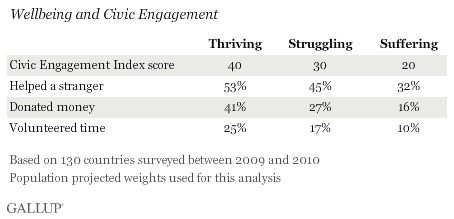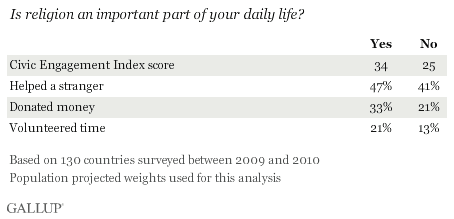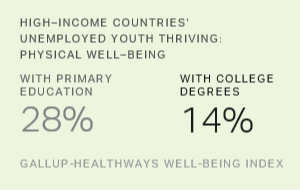WASHINGTON, D.C. -- Gallup surveys in 130 countries show people with higher personal well-being are more likely to say they give something -- time, money, or help to a stranger -- back to their communities. Civic Engagement Index scores, which measure people's likelihood to do all three, are twice as high among those who are "thriving" compared with those who are "suffering."

Gallup classifies individuals as "thriving," "struggling," or "suffering" according to how they rate their current and future lives on a ladder scale based on the Cantril Self-Anchoring Striving Scale. While those with thriving well-being also tend to make more money, controlling for income shows this alone doesn't explain their greater likelihood to give back. While it's difficult to discern whether higher well-being promotes higher civic engagement or the other way around, well-being research by Gallup's Tom Rath and Jim Harter shows people get an emotional boost from doing kind things for other people, and that donating money can have a bigger return on well-being than spending it on material goods.
Religious Adults More Likely to Be Civically Engaged
Given the relationships Gallup finds between religiosity and well-being, it's not too surprising that adults who say religion is an important part of their daily life are more likely to be civically engaged than those who say it is not. The largest difference between these two groups is in regard to donating money, perhaps indicating the inclination among religious adults to give money to charity.

Bottom Line
The Civic Engagement Index is a key measure of an individual's commitment to his or her community and an indicator of his or her likelihood to give back to it. Given that well-being and civic engagement are related, community leaders could benefit from investing in their constituents' well-being and creating an atmosphere in which giving is encouraged.
For complete data sets or custom research from the more than 150 countries Gallup continually surveys, please contact SocialandEconomicAnalysis@gallup.com or call 202.715.3030.
Survey Methods
Results are based on telephone and face-to-face interviews with approximately 1,000 adults in 127 countries, 2,000 adults in Russia, 4,150 in China, and 6,000 adults in India, aged 15 and older, conducted in 2009 and 2010. For results based on the total sample of national adults, one can say with 95% confidence that the maximum margin of sampling error ranged from a low of ±1.7 percentage points in India to a high of ±4.7 percentage points in Haiti. The margin of error reflects the influence of data weighting. In addition to sampling error, question wording and practical difficulties in conducting surveys can introduce error or bias into the findings of public opinion polls.
